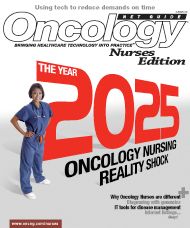DayInTheLife
We spoke with Donna Berry, RN, PhD, AOCN, FAAN, Vice Chair for Research and professor at the University of Washington, Seattle and Nurse Researcher at the Seattle Cancer Care Alliance, about the...
What role do nurse researchers play in oncology patient care?
Nurse researchers conduct programs in research, starting with a line of scientific inquiry in a sustained, coherent area. It means continuing to ask important questions about what is going on with the patient’s experience. I am a doctorally prepared nurse who specializes in oncology. I work to generate new knowledge for the care of patients with cancer or those at risk for cancer. One difference that distinguishes us from physician researchers is that we’re consistently focused on the human response to the cancer experience or the risk of cancer; as opposed to developing a new drug to treat a certain tumor type, we would develop an intervention that focuses on what is happening for the patient during that treatment. And as a PhD-prepared nurse specialist, I’ve been educated to conduct research that addresses those types of questions. I also work with ambulatory care oncology nurses to ascertain whether our clinical practices are based on empiric evidence. When we establish that there is no evidence for a certain part of our practice, we ask a new research question and try to answer it.
Describe one of the interventions you helped develop based on patients’ response to treatment.
Patients who have bladder cancer often receive an agent for treatment called BCG (Bacillus Calmette-Guerin), but one of the side effects is irritation in the bladder, and the patients have a lot of urinary frequency and irritative problems. I did a study a few years ago to address that side effect of the treatment and which intervention is the best for the patient to get through that treatment. We tested whether we could alkalinize and/or dilute the patient’s urine to determine whether that made a difference in their symptom intensity during BCG treatment. The patients who drank an additional two liters of water each day reported lower symptoms.
What is the self-report system you are currently involved with?
I lead the Electronic Self Report Assessment for Cancer (ESRA-C). In that study, we developed an easy way for patients to report their cancer symptoms and their quality of life status. It doesn’t take any computer expertise; they just have to point at the screen and touch their answer. Over the last seven years, Dr. Bill Lober and I developed and tested the Web-based application. We wanted to determine if the doctor and nurse could efficiently focus just on the troublesome symptoms if they had an easy-to-read report on how the patients were doing. About 660 patients have completed the NIH-funded, randomized trial, and we are analyzing the results now.
What is the Customized Internet Decision Support Program?
We just opened that study across the country in four cities. It’s a multi-site national trial, and what we’re testing is an application named the “Personal Patient Profile-Prostate (P4).” We are asking men who use the P4 system if they have less conflict about their decision, are satisfied with their own decision making, and if they feel better prepared for their decision. That study won’t be finished until 2010. P4 is only available in a clinical trial at the moment—we want to carefully study it. There are many educational websites on the Internet that men can look up, or anybody with cancer for that matter, and find treatment information, but none of them provide customized coaching based on what’s important to that individual. Just like any cancer therapy, you want to have evidence for whether it works or not, whether it’s a drug, a behavioral intervention, or an educational intervention. This intervention is designed to facilitate patients’ decision making.
Everybody has their own influential factors when it comes to prostate cancer, and some men will make a decision on prostate cancer based on what happened to their uncle, or even to what happened to their mother who had breast cancer in 1965. One of the things that P4 does is coach the patient to tell his doctor what’s particularly important or influential to the treatment decision, and then the patient and the doctor can have a conversation about that influential factor. We’re expecting that once the conversation happens, the patient will be better prepared and can arrive at a treatment decision that’s the best for that individual.
Please tell us about the Improving Health Literacy Feasibility and Evaluation of Virtual Surrogate Readers.
One of my colleagues, Dr. Seth Wolpin, developed a way to test how people in the community perceived different talking computer voices. This study is quite relevant to our other work because we are committed to making our applications accessible to people who cannot read well or have trouble seeing; we want to make the program accessible by using a computerized reader program, where all the words on the screen are read to the participant or the patient through headphones or speakers.
